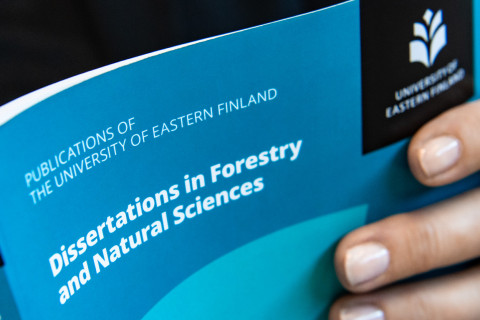The doctoral dissertation in the field of Applied Physics will be examined at the Faculty of Science and Forestry at Kuopio Campus.
What is the topic of your doctoral research, Shohreh Kariminezhad?
Neuropsychiatric disorders affect one out of four people at some point during their life span. As the world’s population is growing and aging rapidly, this issue is turning into one of the core challenges over the next few years. One key measure that can be taken to tackle this challenge is shifting towards more personalized clinical approach based on patient-specific characteristics, requiring e.g. neurobiological markers.
The topic of this doctoral thesis is on introducing a potential biomarker for treatments in which the neuroplasticity is induced. Neuroplasticity is a critical characteristic of living organisms which enables them to adapt to their ever-changing environment. Hence, neuroplasticity has been suggested to play a key role in adaptation to sensory inputs and disturbed plasticity has been put forth as the core pathology of several neuropsychiatric disorders, e.g. while developing neuropathic pain after spinal cord injuries. The biomarker under investigation was an inherent brain stimulus-specific adaptation mechanism known as repetition suppression (RS). RS manifests as diminished neural responses when a sensory stimulus like a loud sound is repeated. Investigating the RS as a potential biomarker for neuroplasticity may serve as a potential foundation for improved individually-based neuromodulation treatments, leading to higher success rate, as RS possibly can help to determine those individuals with neuroplastic capacities to experience recovery and benefit from neuromodulation interventions.
What are the key findings or observations of your doctoral research?
The findings of this doctoral research, conducted on both healthy subjects and chronic pain patients, point to the potential of the RS as a novel biomarker of neuroplasticity. This might help in predicting those more likely to benefit from neuromodulation interventions. The RS demonstrated a good predictive power in distinguishing the chronic pain patients who reported benefit from the neuromodulation interventions from those who did not. Upon successful implementation in clinical practice, this will enable allocation of otherwise limited resources to those patients more likely to respond, provided that the future studies confirm the findings from this research.
What are the key research methods and materials used in your doctoral research?
The RS in this thesis was assessed in the motor system using transcranial magnetic stimulation (TMS), which is an artificial means of excitation. TMS is a non-invasive method that generates an electrical current in the brain by means of rapidly time-varying magnetic fields. Administering TMS over the motor cortex results in muscle electric activity known as motor evoked potentials (MEPs). The TMS-induced RS was scrutinized through analyzing the changes in the properties of MEPs. In the first stage of the research, the RS was evaluated prior to inducing short-term plasticity in healthy subjects while in the final stage, the RS was assessed prior to neuromodulation treatment (using repetitive TMS) in patients suffering from chronic pain.
The doctoral defence of Shohreh Kariminezhad, MSc, entitled Repetition Suppression, A Potential Biomarker for Neuromodulation-induced Plasticity, will be examined at the Faculty of Science and Forestry on 17 December 2021 at noon in Kuopio Campus, Medistudia, MS300. The Opponent will be Professor Vadim Nikulin, Max Planck Institute for Human Cognitive and Brain Sciences, and the Custos will be Professor Petro Julkunen, University of Eastern Finland. Language of the public defence is English.
For further information, please contact:
Shohreh Kariminezhad, [email protected], +358 41 718 0998
